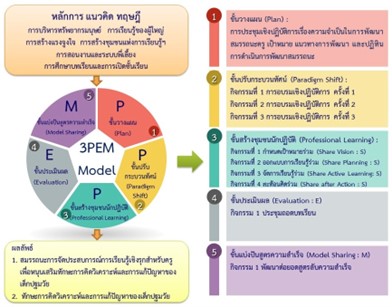A Model for Developing the Competency of Active Learning Experience Management for Teachers to Promote Analytical thinking and Problem-solving Skills of Early Childhood Based on Professional Learning Community (PLC)
DOI:
https://doi.org/10.14456/educu.2024.44Keywords:
a model of competency development, active learning experience management, analytical thinking and problem-solving skills of early childhood, professional learning communityAbstract
The purpose of this research were to 1) create a model for developing competency in active learning management for teachers in order to promote analytical thinking and problem-solving skills of early childhood, with a basis in the Professional Learning Community (PLC). 2) Evaluated the effectiveness of the developed competency development model. The sample consisted of 38 early childhood teachers recruited convenient or voluntarily, 162 early childhood children recruited by simple random sampling from a number of students which the teachers used as a model, The experimental plan was one group pretest-posttest design. Conducted in 4 phases: basic data analysis, create a draft format, test the model, and improvement. The research instruments included the questionnaire, in-depth interviews, and analytical thinking and problem-solving skills tests. Statistical analysis included the mean, standard deviation, and dependent t-test. The results revealed the following. Firstly, the model has 5 steps i.e. Plan (P), Paradigm Shift (P), Professional Learning (P), Evaluation (E), and Model Sharing (M). which is called the 3PEM Model. In addition, there was a user manual which included basic information, plans for competency development, and use of the developed model. The quality of the overall model was at the highest level. Secondly, the effectiveness of the developed competency development model is as follows: the teachers’competency in active learning management was shown to be at a higher level after using the model at a .05 level of significance, both overall and in each aspect., the early childhood children’analytical thinking and problem-solving skills after the experiment, which are significantly higher after using the model at a .05 level of significance, both overall and in each aspect. The analytical thinking aspect has a higher average value than problem solving, and users have opinions towards the overall model at a high level.
References
ภาษาไทย
กมล โพธิเย็น. (2564). Active Learning: การจัดการเรียนรู้ที่ตอบโจทย์การจัดการศึกษาในศตวรรษที่ 21. วารสารศึกษาศาสตร์ มหาวิทยาลัยศิลปากร, 19(1), 11-28.
กระทรวงศึกษาธิการ. (2565 มกราคม, 27). นโยบายการจัดการศึกษาของกระทรวงศึกษาธิการ ปีงบประมาณ พ.ศ.2565. http://www.moe.go.th
ชัชวีร์ แก้วมณี. (2564). การพัฒนารูปแบบชุมชนการเรียนรู้ทางวิชาชีพเพื่อเสริมสร้างสมรรถนะการจัดประสบการณ์การเรียนรู้ของครูปฐมวัยในศตวรรษที่ 21. วารสารราชภัฏยะลา, 16(3), 397- 405.
ชาริณี ตรีวรัญญู. (2558). รายงานวิจัยปฏิบัติการเรื่องบทเรียนของผู้ชี้แนะในโครงการปฏิรูปการเรียนรู้สู่ผู้เรียน: การพัฒนาครู แกนนำโดยใช้การชี้แนะและการเป็นพี่เลี้ยง. สำนักงานคณะกรรมการการศึกษาขั้นพื้นฐาน.
ณัฏฐ์ธณิชาช์ ธารไทรทอง, ปัทมาวดี เล่ห์มงคล, และ อรพรรณ บุตรกตัญญู. (2565). ผลการจัดประสบการณ์การเล่นตามรูปแบบโลกการเล่นเชิงออกแบบผสานชุมชนสืบสอบต่อการคิดแก้ปัญหาของเด็กปฐมวัย. วารสารศึกษาศาสตร์ มสธ, 15(1), 66-84.
ธนกฤต อั้งน้อย. (2563). รูปแบบการพัฒนาสมรรถนะครูใหม่ในศตวรรษที่ 21 ตามแนวคิดโรงเรียนเป็นองค์การแห่งการเรียนรู้ [วิทยานิพนธ์ปริญญาดุษฎีบัณฑิต, มหาวิทยาลัยนเรศวร]. ผลงานวิจัย/วิทยานิพนธ์/IS คณะศึกษาศาสตร์. http://www.edu.nu.ac.th/th/news/docs/download/2020_06_23_15_09_59.pdf
บุญชม ศรีสะอาด. (2560). การวิจัยเบื้องต้น (พิมพ์ครั้งที่ 10). สุวีริยาสาส์น.
นวลจันทร์ จุฑาภักดีกุล. (2561). พัฒนาการทางสมองด้านการคิดในเด็กปฐมวัย. ใน สุภาวดี หาญเมธี และคณะ, (บ.ก.). คู่มือพัฒนาสมอง EF Executive Functions สำหรับครูปฐมวัย. (น.14-25). มติชน.
นันท์นภัส เกตน์โกศัลย์, กรันฑรัตน์ บุญช่วยธนาสิทธิ์, และ สมคิด ปราบภัย. (2565). องค์ประกอบและตัวชี้วัดสมรรถนะการออกแบบการเรียนรู้ของนิสิตนักศึกษาครุ สาขาวิชาสุขศึกษา เพื่อส่งเสริมความรอบรู้ด้านสุขภาพของนักเรียน. วารสารศึกษาศาสตร์ปริทัศน์, 36(3), 43-55.
พิสณุ ฟองศรี. (2557). การสร้างและพัฒนาเครื่องมือวิจัย (พิมพ์ครั้งที่ 4). ด่านสุธาการพิมพ์.
มยุรี เจริญศิริ. (2563). การพัฒนารูปแบบโรงเรียนชุมชนแห่งการเรียนรู้เชิงวิชาชีพ เพื่อเสริมสร้างสมรรถนะของครูในการจัดการเรียนรู้ตามแนวคิด Active Learning ที่ส่งเสริมความสามารถในการสร้างสรรค์นวัตกรรมของนักเรียนระดับประถมศึกษา [วิทยานิพนธ์ปริญญาดุษฎีบัณฑิต, มหาวิทยาลัยศิลปากร]. DSpace JSPUI. http://ithesis-ir.su.ac.th/dspace/handle/123456789/3101
เลิศนภา พงษ์ดำ. (2561). การพัฒนาสมรรถนะในการปฏิบัติงานด้านการจัดการเรียนการสอนของข้าราชการครู : กรณีศึกษา โรงเรียนสุเหร่าดอนสะแก [วิทยานิพนธ์ปริญญาดุษฎีบัณฑิต ไม่ได้ตีพิมพ์]. มหาวิทยาลัยรามคำแหง.
วัชรภัทร เตชะวัฒนศิริดำรง. (2565). การพัฒนาสมรรถนะครูคืนถิ่นภาคกลางตอนบนตามมาตรฐานวิชาชีพครูของสำนักงานคณะกรรมการการอุดมศึกษา. วารสารศึกษาศาสตร์ มหาวิทยาลัยสงขลานครินทร์ วิทยาเขตปัตตานี, 33(1), 212-222.
ศิตา เยี่ยมขันติถาวร. (2562). ทำความเข้าใจกับแนวคิดพื้นฐานชุมชนแห่งการเรียนรู้ทางวิชาชีพ. วารสารพัฒนาการเรียนการสอน มหาวิทยาลัยรังสิต, 13(1), 158-165.
ศิวพร วิยะวงศ์. (2564). แนวทางการบริหารทรัพยากรมนุษย์เพื่อสนับสนุนให้เกิดองค์กรที่มุ่งเน้นการสร้างผลงานและขับเคลื่อนด้วยศักยภาพของบุคลากรเป็นสำคัญ (Performance Driven Organization). [วิทยานิพนธ์ปริญญามหาบัณฑิต, มหาวิทยาลัยมหิดล]. CMMU Digital Archive. https://archive.cm.mahidol.ac.th/handle/123456789/4144
สายฝน แสนใจพรม. (2561). รูปแบบการพัฒนาสมรรถนะของครูในการจัดการเรียนรู้ด้านสุขอนามัยสำหรับโรงเรียนบนพื้นที่สูง. วารสารวิจัยราชภัฏเชียงใหม่, 19(1), 51-63.
สุวิมล ว่องวาณิช. (2558). การวิจัยประเมินความต้องการจำเป็น. สำนักพิมพ์แห่งจุฬาลงกรณ์มหาวิทยาลัย.
สำนักงานเลขาธิการสภาการศึกษา. (2560). แผนการศึกษาชาติ พ.ศ.2560-2579. พริกหวานกราฟฟิค.
สำนักงานเลขาธิการสภาการศึกษา. (2562). สภาวะการศึกษาไทย 2561/1562 การปฏิรูปการศึกษาในยุคดิจิทัล. ภาพิมพ์ จำกัด.
สำนักงานเลขาธิการสภาการศึกษา. (2566 มิถนายน, 1). รายงานประจำปี 2566. http://www.onec.go.th
อนุศรา อุดทะ และ จิติมา วรรณศรี. (2563). รูปแบบการพัฒนาสมรรถนะของครูปฐมวัย สังกัดกรมการปกครองส่วนท้องถิ่น. วารสารศึกษาศาสตร์ มหาวิทยาลัยนเรศวร, 22(4), 305-316.
อพัชชา ช้างขวัญยืน, รุจโรจน์ แก้วอุไร, วินัย วงษ์ไทย, และ เอื้อมพร หลินเจริญ. (2564). การจัดการเรียนรู้เชิงรุกเพื่อส่งเสริมความเป็นพลเมืองดิจิทัล. วารสารศึกษาศาสตร์ มหาวิทยาลัยนเรศวร, 23(3), 452- 465.
ภาษาอังกฤษ
Bloom, B.S. (1956). Taxonomy of Educational Objective Handbook 1: Cognitive Domain. David Mckey Company.Inc.
Botha, W. (2020 April,17). Cooperative Learning-Building cooperative learning skills and attitudes. https://www.researchgate.net/publication/340683766_Cooperative_ Learning-Building_cooperative_learning_skills_and_attitudes.
Cambell, D. T., & Stanley, J. C. (1969). Experimental and Quasi-Experimental Design for Research. Houghton Mifflin.
Costa, A.L. & Garmston, R.J. (2002). Cognitive Coaching: A Foundation for Renaissance School (2nd ed). Christopher Gordon.
Dufour, R., Dufour, R., & Eaker, R. (2008). Revisiting professional learning communities at work: New insights for improving schools. Bloomington, IL: Solution Tree Press.
Glatthorn, A. A. (1990). Differentiated Supervision. Washington D.C. : Association for Supervision and Curriculum Development.
Glickman, C. D. (2004). Supervision and instructional leadership: A developmental approach (6th ed). Allyn & Bacon.
HerZberg, F., Mausner, B. & Snyderman, B.B. (1959). The Motivation to Work. New. York: Wiley. https://www.semanticscholar.org/paper/The-motivation-to-work-Herzberg-Mausner/0400d371067878705b0c3de99fd237fa985fa874?sort=is-influential
Hord, S.M. (1997). Professional learning communities: Communities of continuous inquiry and improvement. Texas: Southwest Educational Development Laboratory. https://files.eric.ed.gov/fulltext/ED410659.pdf
Joyce, B., & Weil, M. (1986). Models of teaching. Allyn and Bacon.

Downloads
Published
How to Cite
Issue
Section
License

This work is licensed under a Creative Commons Attribution-NonCommercial-NoDerivatives 4.0 International License.



